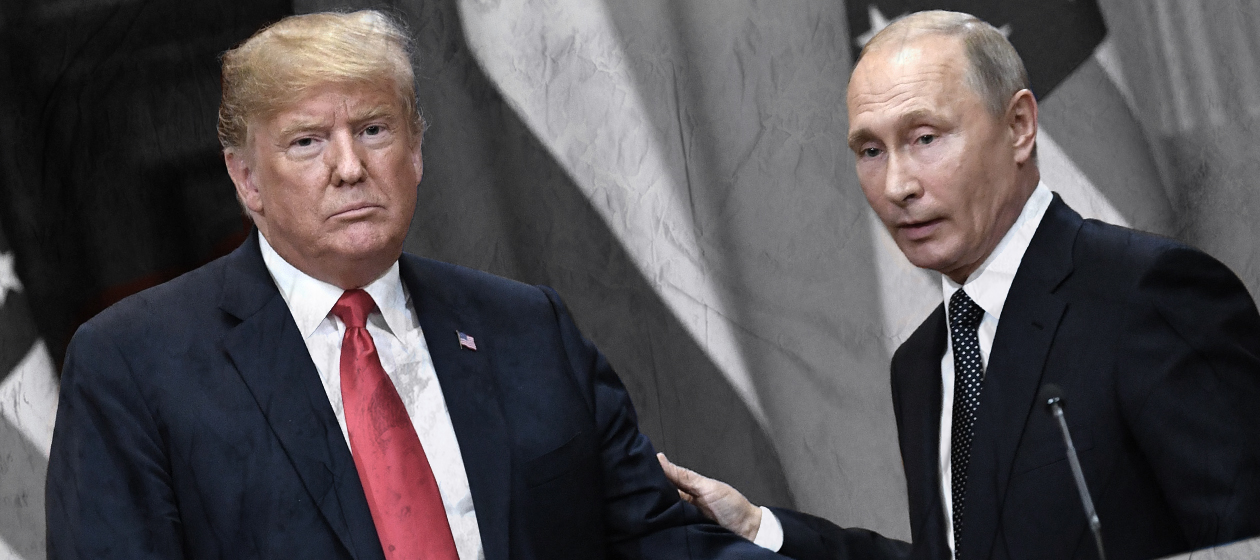The Trump-Putin summit was a repulsive spectacle. It was also pointless.
The Helsinki summit was a carnival of lib-owning obfuscation


A free daily email with the biggest news stories of the day – and the best features from TheWeek.com
You are now subscribed
Your newsletter sign-up was successful
If you were expecting President Trump and his Russian counterpart to say anything of interest about Robert Mueller's ongoing investigation of the 2016 election in Helsinki on Monday, you were always going to be disappointed. Frank language about possible collusion was about as likely as real-life evidence of the apparently unkillable liberal slash fiction in which Trump and Vladimir Putin are lovers who ride flying unicorns together. The pee tape, if it exists, is safe inside a Kremlin MacBook.
Whatever words the two might have exchanged about interference by Russians in our last presidential contest — a reality as incontestable as the similar efforts made by the United States in Russia and countless other countries across the world — away from the cameras and microphones could have been hugely significant. Or they might have been the same throwaway nonsense we all heard. We will probably never know.
The televised portion of the summit was a carnival that took place inside an actual hall of mirrors. Candelabras flared above rococo gilt in the Finnish presidential palace while two important men said absolutely nothing for an hour straight. It was a baroque festival of lib-owning obfuscation, a calculated and immediately successful attempt to elicit over-the-top responses to the anti-revelation of non- or pseudo-facts. The two presidents informed us that war in Syria is bad, that business is good, that peace is a desirable goal, that soccer balls make nice gifts for children.
The Week
Escape your echo chamber. Get the facts behind the news, plus analysis from multiple perspectives.

Sign up for The Week's Free Newsletters
From our morning news briefing to a weekly Good News Newsletter, get the best of The Week delivered directly to your inbox.
From our morning news briefing to a weekly Good News Newsletter, get the best of The Week delivered directly to your inbox.
There was a certain amount of high-level trolling on Monday. Standing on the dais beside the leader of a country whose intelligence service has been accused of hacking the server of an American political party, Trump insisted that it is in the best interests of the United States and Russia to "collaborate" on issues related to online security, something I have never heard even the most craven of the president's Republican defenders suggest. Putin even jokingly alluded to his own career as an intelligence officer. Hardy har.
Most of us fell for it, though. Excitable American television anchors and former government officials are already calling Trump's appearance "treason." This is gibberish. The summit was a repulsive and pointless spectacle, like Barack Obama's joint remarks with President Raul Castro of Cuba and, indeed, many public meetings between the leaders of nations. The only difference is that this time at least one of them was committed to making sure that the show was as dispiriting and groan-inducing as possible, instead of just mouthing along with the requisite banalities.
What are the actual takeaways from the meeting? One is that, despite his repeated calls for moving on from 2016, Trump is just as obsessed with the never-ending election as his critics. This is why we heard as much about George Soros on Monday as we did about Syria. The "disaster" that is the Mueller probe, Hillary Clinton's emails, the supposed malfeasance of FBI agent Peter Strzok: These are never going away, in part because harping on about them is more important to our commander in chief than any substantive issue. If nothing else, it is clear that Trump despises his domestic political opponents more than he does his adversaries abroad. But this is probably true of most world leaders.
Trump thinks he has nothing to lose by belittling Europe — his recent suggestion that the European Union is a "foe" of the United States is a rare actual example of a gaffe that would have been world-historic if this were any other president — and something to gain by playing nice with Russia. But what exactly? Is it the no-doubt laudable goal of saving "hundreds of thousands of lives" in Syria? Is it some hazy vision of the shared flourishing of the two countries' respective petrochemical industries in Asian and European markets? Is it the possibility of some kind of tenuous and ad-hoc alliance against China, which is consolidating its ties with the EU as I write this?
A free daily email with the biggest news stories of the day – and the best features from TheWeek.com
I don't think Trump cares about any of these things. It seems to me likely that his primary consideration when it comes to deciding American foreign policy toward the Russian Federation is raising the most hackles at Fake News CNN. If that really is the goal, Trump is a master of diplomacy and Monday's summit was a Bismarckian tour de force.
Hurray, I guess?
Matthew Walther is a national correspondent at The Week. His work has also appeared in First Things, The Spectator of London, The Catholic Herald, National Review, and other publications. He is currently writing a biography of the Rev. Montague Summers. He is also a Robert Novak Journalism Fellow.
